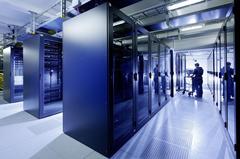URL: https://www.desy.de/news/news_search/index_eng.html
Breadcrumb Navigation
DESY News: Computer vs COVID-19
News
News from the DESY research centre
Computer vs COVID-19
Everyone knows the eerie visualisation of the coronavirus ... but what do its protein structures and protein bindings really look like? Which known drugs could possibly dock to these structures? Answers to these questions might considerably accelerate the development of therapies against COVID-19. DESY's IT department supports this cutting-edge research with several projects by providing computer power and know-how.

DESY computer centre. Image: DESY, Heiner Müller-Elsner
Participation in these projects is voluntary, and individual laptops and desktops up to supercomputers may contribute. At present, the sum of the computers connected to the network exceeds the computing capacity of the world's most powerful supercomputer many times over, which means that much more data can be evaluated in a shorter time, which might possibly shorten the search for a drug.
DESY is also participating in these activities. Rosetta@home and Folding@home, for instance, are run in the large computer systems in Hamburg and Zeuthen and contributed about 3.5 million CPU hours in the month of April - this is equivalent to the performance of about 1200 laptops calculating day and night for a whole month.
The DESY IT groups in Hamburg and Zeuthen operate powerful computer systems in their data centres, which are part of the worldwide computing infrastructure for the LHC experiments ATLAS and CMS. In agreement with the DESY groups of the two experiments, part of the computing power provided for this purpose is also made available to the Folding@Home project.
A high-performance computer operated by DESY, the Maxwell Cluster in Hamburg, still has a very special role to play in the fight against the corona virus: data analysis of the experiments carried out at PETRA III is underway here. Users receive prioritised access for these computing tasks.
About half a million CPU hours have been reserved for the analysis of the measured data, comparable to about 200 laptops that calculate day and night for a whole month. The results of these calculations have been incorporated into a first pre-publication.
DESY currently provides about 10 percent of its computing power for corona computing. The computer systems at DESY consist of several computing clusters, which are made up of a total of 1600 server systems. The computing power is usually provided by two processors (CPUs) each, which themselves consist of several CPU cores in order to process several computing tasks in parallel. The participating DESY computing clusters have a total of about 55 000 CPU cores - which corresponds to the computing power of 14 000 laptops. Some of the server systems used have graphics card processors (GPU), which can, among other things, carry out the calculations relevant in the corona environment particularly efficiently and quickly.



